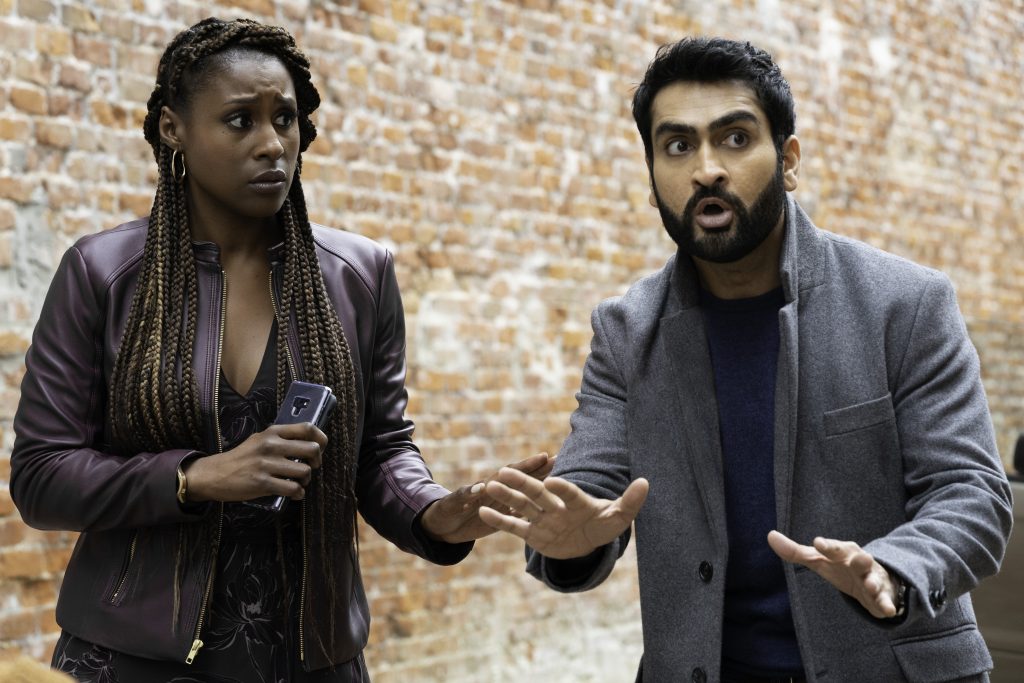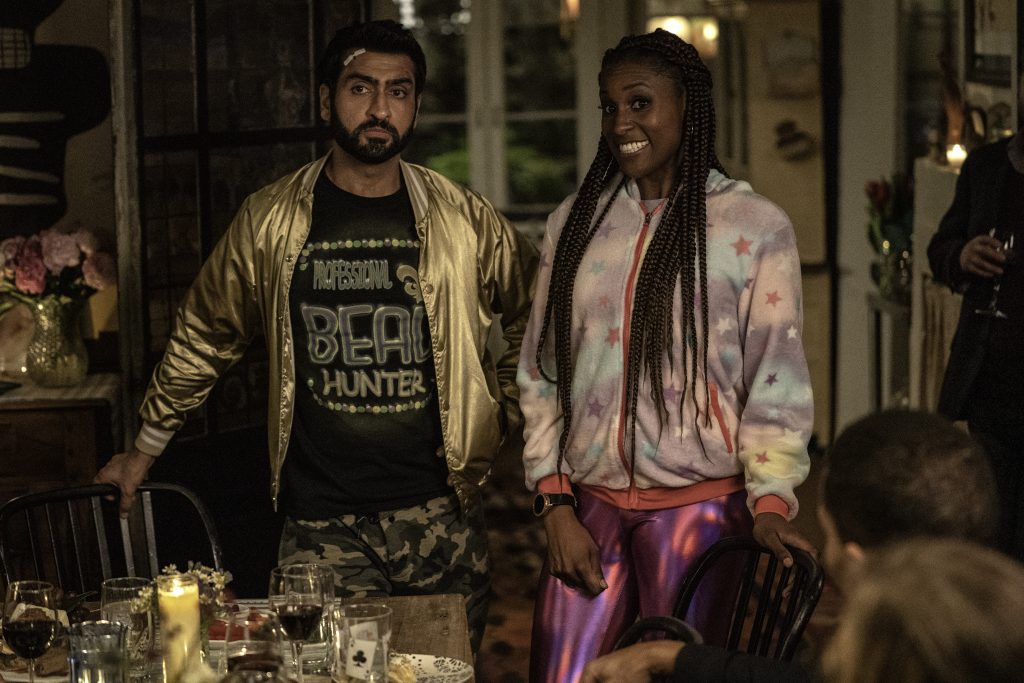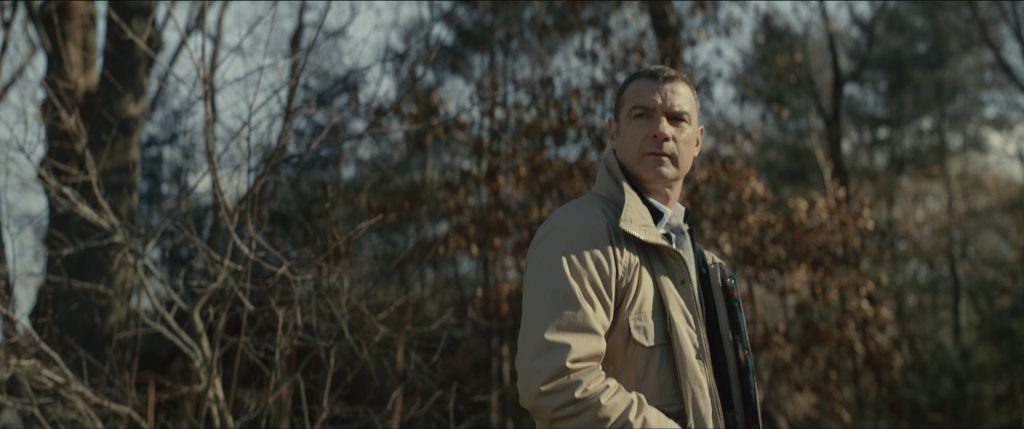May 20, 2020
by Carla Hay

Directed by Michael Showalter
Culture Representation: Taking place in New Orleans, the comedy “The Lovebirds” has a racially diverse cast (African Americans, Asians and white people) representing the middle-class and upper-class.
Culture Clash: Two bickering lovers try to solve a murder mystery so they won’t get blamed for the crime.
Culture Audience: “The Lovebirds” will appeal primarily to fans of Issa Rae, Kumail Nanjiani and predictable comedies that mix romance and action.

“The Lovebirds” is a perfect example of a movie whose trailer makes the film look a lot better than it actually is. It’s disappointing, since the comedic talents of Issa Rae and Kumail Nanjiani (the movie’s title characters) are wasted on a formulaic screenplay and pacing that is at times surprisingly dull for an action-oriented movie.
Paramount Pictures was originally going to release “The Lovebirds” in cinemas on April 3, 2020. But then, the coronavirus pandemic happened, movie theaters worldwide were shut down, Paramount dumped “The Lovebirds,” and gave the rights to Netflix. Given Netflix’s tendency to have silly and forgettable romantic comedy films, “The Lovebirds” is right at home on the streaming service. If the movie had been released in theaters, it certainly would not have been worth a full ticket price.
“The Lovebirds” starts out very promising in its first 20 minutes. The opening scene is of new couple Jibran (played by Nanjiani) and Leilani (played by Rae) having a blissful moment the morning after spending the night together for the first time. They head to a café, where they make the decision that their new relationship status has made it officially okay to kiss each other in public.
Four years later, Jibran and Leilani are living together, and their relationship has turned into a bickering hell. Jibran is an aspiring documentarian who hasn’t been able to finish his film about corruption in the education system. Leilani works at an ad agency and is the main earner for the household.
Leilani seems to resent that she has to carry most of the financial burden for the couple and is growing impatient that Jibran isn’t pulling his share of the weight. Meanwhile, Jibran is resentful that Leilani doesn’t understand the process of making the documentary, and he thinks she’s the one who’s being unreasonable. The concept of “success” and how it’s tied into self-esteem and respect from a love partner are the real issues in the relationship, but these issues come out in their arguments in petty ways.
For example, Leilani thinks it would be fun for her and Jibran to be contestants on the reality show “The Amazing Race,” a competition where teams of two complete challenges around the world, with the winning team getting a $1 million prize. Leilani has been begging Jibran to apply to the show with her, but he refuses because he’s a snob about reality TV and he’s insulted when Leilani compares documentaries to reality shows.
Meanwhile, Leilani is very social-media conscious and cares a great deal about what other couples in their circle of friends are posting on their social media, but Jibran could care less. When a mutual-friend couple announce their engagement on social media, Jibran chastises Leilani for “liking” the engagement photo, because she’s told him that she thinks marriage is “problematic.” But Leilani argues that if she didn’t “like” the photo, then she would look like a hater to everyone else.
Their arguing escalates into a huge shouting match where Jibran yells, “I don’t want to settle for someone who’s so fucking shallow!” Leilani responds with an insult that cuts even deeper: “I don’t want to settle for someone who’s satisfied with being a failure.” It’s at this point, that it looks like Jibran and Leilani have decided to end their relationship.
This argument is actually the best scene in the movie, which is why it’s so disappointing that the quality of the “Lovebirds” screenplay goes downhill from there. The next day, while Jibran and Leilani are in a car together (he’s driving and she’s in the passenger seat), they begin arguing again about their relationship. Their bickering is suddenly interrupted when a man on a bicycle (played by Nicholas X. Parsons) crashes into their windshield.
A horrified Jibran and Leilani get out of the car and ask the man if he needs help, but he refuses and quickly rides off without noticing that he has dropped his phone, which Jibran keeps to probably turn in later. Suddenly, a mustachioed man (played by Paul Sparks) comes up to the couple and identifies himself as a cop who needs to use their car to chase after the man on the bike.
He quickly takes the wheel of the car, while Jibran and Leilani are both terrified and excited at being part of this car chase. Through some action-packed twists and turns, the biker gets cornered and the driver hits him with the car. Instead of calling for medical assistance, the driver instead runs over the man and kills him.
That’s when Leilani and Jibran realize that this mystery carjacker isn’t a cop after all. (The fact that he wasn’t concerned about getting police backup during the car chase should’ve been a big clue.) And after the bicyclist is lying dead in the street, the carjacker/murderer runs away, just as another couple walks up and sees Jibran and Leilani standing next to the dead body.
The other couple assumes that Jibran and Leilani are responsible for killing the dead man with the car, so they immediately call 911. That leads to Jibran and Leilani frantically denying that they were responsible and trying to explain that a mystery man who ran away actually committed the crime. It doesn’t sound believable, so Jibran and Leilani both panic and run away, but not before calling out each other’s names so the female 911 caller can tell the police that information.
While taking refuge at a local restaurant, Leilani convinces a reluctant Jibran that they should try to solve the murder mystery on their own so they won’t get blamed for the crime. Her thinking is that it’s up to them to prove their innocence because the police won’t believe their story and it already looks bad that they ran away from the scene of the crime.
Jibran thinks it’s a better idea to explain to the police what happened, but Leilani refuses. She also plays into the couple’s fears of police treating black and brown people worse than other races, and that’s ultimately why Jibran goes along with her plan. The rest of the movie, which takes place over the course of one night, consists of Jibran and Leilani getting into more and more ridiculous situations.
Whether it’s a coincidence or not, Nanjiani previously co-starred in another over-the-top action comedy about a wacky twosome trying to solve a crime, in 2019’s “Stuber.” In “Stuber,” Uber was the ride-sharing service that gets a lot of product placement, while “The Lovebirds” has Lyft as the ride-sharing service of choice. “The Lovebirds” isn’t as annoying and silly as “Stuber,” but it’s pretty close. (You know a movie is bad if one of its big comedic scenes has the stars of the movie singing along when they hear Katy Perry’s “Firework.”)
The biggest disappointment of “The Lovebirds” is how often the movie’s pace drags when it shouldn’t. A scene with Jibran and Leilani ending up at a mysterious black-tie gathering with people wearing masks (something that’s in the movie’s trailer) could have been hilarious, but the humor ends up falling flat.
There are also some fight scenes that don’t make sense. For example, Jibran and Leilani break into what looks like a fraternity house and brutally assault one of the guys there (it’s in the trailer), but while this fight is going on, the other house residents who are in the next room unrealistically don’t hear this very loud and raucous fight. “The Lovebirds” is one of those slapstick movies where certain people get injuries that would send someone to a hospital in real life, but the severely injured person is still able to function as if the injury is nothing more than a pesky bruise.
Michael Showalter directed “The Lovebirds” after previously directing Nanjiani in the 2017 comedy “The Big Sick,” a film inspired by the real-life love story of Nanjiani and his wife Emily V. Gordon, who both wrote the film’s Oscar-nominated screenplay. The difference in quality between “The Big Sick” and “The Lovebirds” shows how crucial having a well-written screenplay can be, even if the director is the same. Aaron Abrams and Brendan Gall, who wrote the formulaic and uninspired screenplay for “The Lovebirds,” mainly have a background in television (they both worked on the TV series “Blindspot”), so it seems they have a way to go before they can master the art of writing comedic feature films.
Rae and Nanjiani (who are executive producers of “The Lovebirds”) are both talented writers/actors who found fame on HBO comedy series—Rae on “Insecure,” Nanjiani on “Silicon Valley.” You can’t help but wonder how much better “The Lovebirds” would have been if Rae and/or Nanjiani had written the screenplay. Their performances in “The Lovebirds” sometimes elevate what is essentially lowbrow movie material, but the appealing personalities of these actors just can’t quite turn this stinking mess of a movie into the comedy feast that it should have been.
Netflix will premiere “The Lovebirds” on May 22, 2020.


